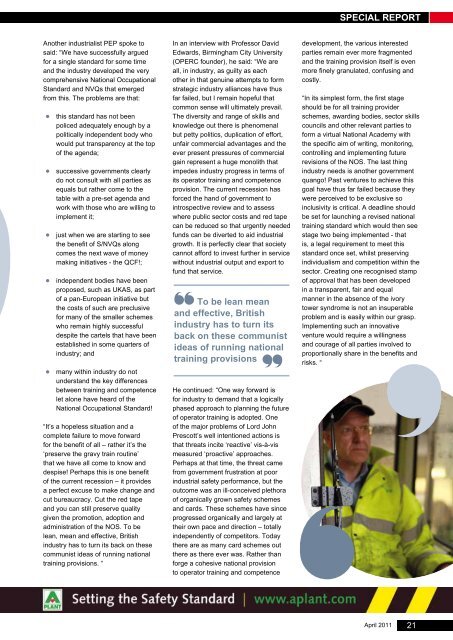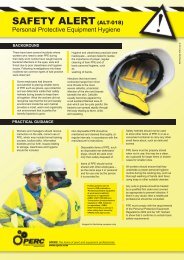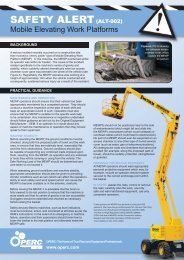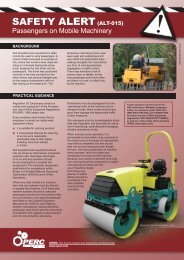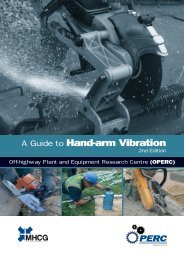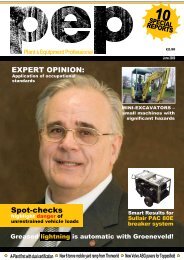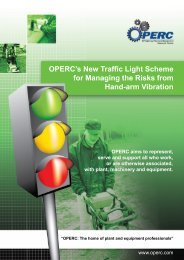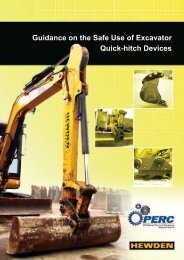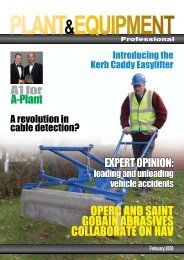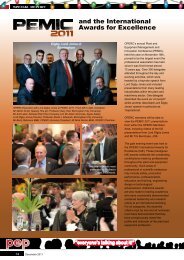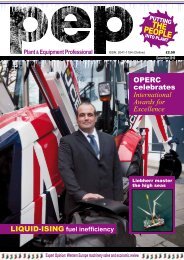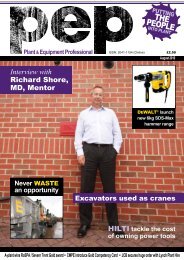the PeoPle - OPERC - Off-highway Plant and Equipment Research ...
the PeoPle - OPERC - Off-highway Plant and Equipment Research ...
the PeoPle - OPERC - Off-highway Plant and Equipment Research ...
Create successful ePaper yourself
Turn your PDF publications into a flip-book with our unique Google optimized e-Paper software.
Ano<strong>the</strong>r industrialist PEP spoke to<br />
said: “We have successfully argued<br />
for a single st<strong>and</strong>ard for some time<br />
<strong>and</strong> <strong>the</strong> industry developed <strong>the</strong> very<br />
comprehensive National Occupational<br />
St<strong>and</strong>ard <strong>and</strong> NVQs that emerged<br />
from this. The problems are that:<br />
● this st<strong>and</strong>ard has not been<br />
policed adequately enough by a<br />
politically independent body who<br />
would put transparency at <strong>the</strong> top<br />
of <strong>the</strong> agenda;<br />
● successive governments clearly<br />
do not consult with all parties as<br />
equals but ra<strong>the</strong>r come to <strong>the</strong><br />
table with a pre-set agenda <strong>and</strong><br />
work with those who are willing to<br />
implement it;<br />
● just when we are starting to see<br />
<strong>the</strong> benefit of S/NVQs along<br />
comes <strong>the</strong> next wave of money<br />
making initiatives - <strong>the</strong> QCF!;<br />
● independent bodies have been<br />
proposed, such as UKAS, as part<br />
of a pan-European initiative but<br />
<strong>the</strong> costs of such are preclusive<br />
for many of <strong>the</strong> smaller schemes<br />
who remain highly successful<br />
despite <strong>the</strong> cartels that have been<br />
established in some quarters of<br />
industry; <strong>and</strong><br />
● many within industry do not<br />
underst<strong>and</strong> <strong>the</strong> key differences<br />
between training <strong>and</strong> competence<br />
let alone have heard of <strong>the</strong><br />
National Occupational St<strong>and</strong>ard!<br />
“It’s a hopeless situation <strong>and</strong> a<br />
complete failure to move forward<br />
for <strong>the</strong> benefit of all – ra<strong>the</strong>r it’s <strong>the</strong><br />
‘preserve <strong>the</strong> gravy train routine’<br />
that we have all come to know <strong>and</strong><br />
despise! Perhaps this is one benefit<br />
of <strong>the</strong> current recession – it provides<br />
a perfect excuse to make change <strong>and</strong><br />
cut bureaucracy. Cut <strong>the</strong> red tape<br />
<strong>and</strong> you can still preserve quality<br />
given <strong>the</strong> promotion, adoption <strong>and</strong><br />
administration of <strong>the</strong> NOS. To be<br />
lean, mean <strong>and</strong> effective, British<br />
industry has to turn its back on <strong>the</strong>se<br />
communist ideas of running national<br />
training provisions.<br />
Michael<br />
“<br />
Easton<br />
Sales <strong>and</strong> Marketing Director<br />
In an interview with Professor David<br />
Edwards, Birmingham City University<br />
(<strong>OPERC</strong> founder), he said: “We are<br />
all, in industry, as guilty as each<br />
o<strong>the</strong>r in that genuine attempts to form<br />
strategic industry alliances have thus<br />
far failed, but I remain hopeful that<br />
common sense will ultimately prevail.<br />
The diversity <strong>and</strong> range of skills <strong>and</strong><br />
knowledge out <strong>the</strong>re is phenomenal<br />
but petty politics, duplication of effort,<br />
unfair commercial advantages <strong>and</strong> <strong>the</strong><br />
ever present pressures of commercial<br />
gain represent a huge monolith that<br />
impedes industry progress in terms of<br />
its operator training <strong>and</strong> competence<br />
provision. The current recession has<br />
forced <strong>the</strong> h<strong>and</strong> of government to<br />
introspective review <strong>and</strong> to assess<br />
where public sector costs <strong>and</strong> red tape<br />
can be reduced so that urgently needed<br />
funds can be diverted to aid industrial<br />
growth. It is perfectly clear that society<br />
cannot afford to invest fur<strong>the</strong>r in service<br />
without industrial output <strong>and</strong> export to<br />
fund that service.<br />
To be lean mean<br />
<strong>and</strong> effective, British<br />
industry has to turn its<br />
back on <strong>the</strong>se communist<br />
ideas of running national<br />
training provisions<br />
He continued: “One way forward is<br />
for industry to dem<strong>and</strong> that a logically<br />
phased approach to planning <strong>the</strong> future<br />
of operator training is adopted. One<br />
of <strong>the</strong> major problems of Lord John<br />
Prescott’s well intentioned actions is<br />
that threats incite ‘reactive’ vis-à-vis<br />
measured ‘proactive’ approaches.<br />
Perhaps at that time, <strong>the</strong> threat came<br />
from government frustration at poor<br />
industrial safety performance, but <strong>the</strong><br />
outcome was an ill-conceived plethora<br />
of organically grown safety schemes<br />
<strong>and</strong> cards. These schemes have since<br />
progressed organically <strong>and</strong> largely at<br />
<strong>the</strong>ir own pace <strong>and</strong> direction – totally<br />
independently of competitors. Today<br />
<strong>the</strong>re are as many card schemes out<br />
<strong>the</strong>re as <strong>the</strong>re ever was. Ra<strong>the</strong>r than<br />
forge a cohesive national provision<br />
to operator training <strong>and</strong> competence<br />
SPECIAL REPORT<br />
development, <strong>the</strong> various interested<br />
parties remain ever more fragmented<br />
<strong>and</strong> <strong>the</strong> training provision itself is even<br />
more finely granulated, confusing <strong>and</strong><br />
costly.<br />
“In its simplest form, <strong>the</strong> first stage<br />
should be for all training provider<br />
schemes, awarding bodies, sector skills<br />
councils <strong>and</strong> o<strong>the</strong>r relevant parties to<br />
form a virtual National Academy with<br />
<strong>the</strong> specific aim of writing, monitoring,<br />
controlling <strong>and</strong> implementing future<br />
revisions of <strong>the</strong> NOS. The last thing<br />
industry needs is ano<strong>the</strong>r government<br />
quango! Past ventures to achieve this<br />
goal have thus far failed because <strong>the</strong>y<br />
were perceived to be exclusive so<br />
inclusivity is critical. A deadline should<br />
be set for launching a revised national<br />
training st<strong>and</strong>ard which would <strong>the</strong>n see<br />
stage two being implemented - that<br />
is, a legal requirement to meet this<br />
st<strong>and</strong>ard once set, whilst preserving<br />
individualism <strong>and</strong> competition within <strong>the</strong><br />
sector. Creating one recognised stamp<br />
of approval that has been developed<br />
in a transparent, fair <strong>and</strong> equal<br />
manner in <strong>the</strong> absence of <strong>the</strong> ivory<br />
tower syndrome is not an insuperable<br />
problem <strong>and</strong> is easily within our grasp.<br />
Implementing such an innovative<br />
venture would require a willingness<br />
<strong>and</strong> courage of all parties involved to<br />
proportionally share in <strong>the</strong> benefits <strong>and</strong><br />
risks. “<br />
April 2011<br />
21


